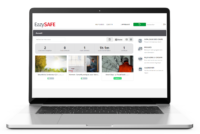Wellbeing in Times of Uncertainty

ALAN WHITE
Wellness Consultant
EazySAFE
Never in living memory have our lives changed so drastically than over the past number of days. New phrases such as ‘social distancing’ and ‘self-isolating’ form part of the global narrative and therefore most conversations at the moment. As workplaces adapt their practices for the health and safety of their workers, many of us find ourselves working alone or working from home. While we adapt to these drastic changes, both employees and employers need to focus not only on maintaining productivity levels but also the wellbeing of everyone in the organisation. There are a number of factors that can affect someone’s wellbeing and increase anxiety in the current circumstances we find ourselves in, but two of the biggest influences are fear of uncertainty and the loss of structure and routine in our lives. However there are things we can do to counteract these and help to reduce our stress levels both in work and our personal lives. Leaders play a big role in helping their staff cope with the many challenges we face in how we work and interact with each other.
Fear of Uncertainty
Uncertainty creates fear, and fear can influence how we think, behave and consequently the decisions we make. When we are thinking through the lens of fear we cannot think logically or rationally. Fear triggers our fight or flight response which shuts down the prefrontal cortex in our brain which is the area that governs logic and reasoning. This is so that when we are faced with immediate physical danger we act on instinct and don’t waste time logically assessing our options.
It’s easy to see why this is important in certain situations, but counterproductive in how we need to work to find new ways of working together at the moment. As humans, we thrive on structure, routine and order in our lives. We feel at our best when we have a sense of control which a regular routine gives us. It’s important that whatever situation you find yourself in at the moment that you develop a routine to your day as quickly as possible. This is where leaders should focus their attention on supporting all staff to do this.
Regular online meetings, phone calls or emails to not only get progress reports but to ask how people are adapting and to share suggestions on how they are developing new routines. This connection with each other even remotely will give everyone a sense that they are supported and help to reduce the anxiety of uncertainty around a situation that is largely outside of our control.
Doing Good
By supporting each other in this way, with a commitment shown from senior management and throughout the organisation, a culture of doing good to support colleagues will quickly develop. When colleagues support each other by doing good things for each other, morale grows exponentially. Remember that everyone working in your organisation will be facing challenges they have never faced before. Some might not see anyone else all day and other might be trying to work from home while trying to make sure their children are keeping up to date with their school work. This is why it’s important to remember to ask how people are doing and offering support.
Perspective
For most of us our perceptual spheres or how we perceive the world around us can be quite narrow. This is largely a good thing for our mental wellbeing as it allows us to structure our reality and feel we have a certain amount of control over our lives. When our perceptions are widened by interesting new things like trying a new hobby or visiting a new country, it gives us a sense of adventure and enjoyment. However when our perceptual spheres are widened by negative or worrying events it can increase our anxiety levels and affect us both mentally and physically. Stress and anxiety can affect our sleep, appetite and make us fall into negative though cycles. It’s important now to ensure that the things we know to be good for us are prioritised at the moment, such as exercise, good sleep, connecting with family and friends even though that will be on the phone or video chat for a while. It is staying connected that will ultimately that will help us adapt to our temporary new normal.
To learn more or promote wellness for your remote workers, or if you yourself are working remotely, check out our resources to help here, here and here.

Discover our Safety Training Platform
Train your employees anytime, anywhere with our environmental, health, safety and wellness training platform.

TAILORED TRAINING
Discover our safety training courses and ehs onboardings, which can be customised and offered in several languages.

SAFETY MANAGEMENT
Ensure the distribution of your safety policy by training your permanent, temporary or seasonal staff.

GLOBAL MONITORING
Simplify the management of your safety policy thanks to the numerous dashboards and training reports.
